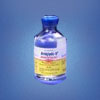What is Amikin Pediatric (Amikacin)?
 Amikacin is an antibiotic. It fights bacteria in the body.
Amikacin is an antibiotic. It fights bacteria in the body.
Amikacin is used to treat severe or serious bacterial infections.
Amikacin may also be used for purposes other than those listed in this medication guide.
What is the most important information I should know about Amikin Pediatric (Amikacin)?
If you are injecting amikacin at home, your healthcare provider will give you detailed instructions on how and where to inject the medication. If you do not understand these directions, do not attempt to inject the medication. Contact your healthcare provider for further instructions.
Amikacin may cause damage to the kidneys and/or nerves. Kidney function and drug levels in the blood may be monitored with blood tests during treatment. Tell your doctor if you experience hearing loss, dizziness, numbness, skin tingling, muscle twitching, or seizures which may be signs of nerve damage.
What should I discuss with my healthcare provider before taking Amikin Pediatric (Amikacin)?
Do not use amikacin without first talking to your doctor if you have
- sulfite sensitivity
- kidney disease
- hearing loss or loss of balance due to ear problems
- Parkinson’s disease; or
- a neuromuscular disorder such as myasthenia gravis
You may not be able to use amikacin, or you may require a dosage adjustment or special monitoring during treatment if you have any of the conditions listed above.
Do not use amikacin without first talking to your doctor if you are pregnant or could become pregnant during treatment.
Do not use amikacin without first talking to your doctor if you are breast-feeding a baby.
Amikin Pediatric Side Effects
What are the possible side effects of Amikin Pediatric (Amikacin)?
If you experience any of the following serious side effects, stop taking amikacin and seek emergency medical attention:
- an allergic reaction (shortness of breath; closing of the throat; hives; swelling of the lips, face, or tongue; rash; or fainting)
- little or no urine
- decreased hearing or ringing in the ears
- dizziness, clumsiness, or unsteadiness
- numbness, skin tingling, muscle twitching, or seizures; or
- severe watery diarrhea and abdominal cramps
Other, less serious side effects may be more likely to occur. Continue to take amikacin and talk to your doctor if you experience
- increased thirst
- loss of appetite
- nausea or vomiting
- a rash
Side effects other than those listed here may also occur. Talk to your doctor about any side effect that seems unusual or that is especially bothersome. You may report side effects to FDA at 1-800-FDA-1088.
Amikin Pediatric Interactions
What other drugs affect Amikin Pediatric (Amikacin)?
Other drugs, especially those that affect the kidneys, can interact with amikacin resulting in dangerous side effects and/or decreased effectiveness. Do not take any other prescription or over-the-counter medicines, including vitamins, minerals, and herbal products, without first talking to your doctor during treatment with amikacin.
What should I avoid while taking Amikin Pediatric (Amikacin)?
There are no restrictions on food, beverages, or activity while taking amikacin unless otherwise directed by your doctor.
Amikin Pediatric Dosage
How should I take Amikin Pediatric (Amikacin)?
If you are injecting amikacin at home, your healthcare provider will give you detailed instructions on how and where to inject the medication. If you do not understand these directions, do not attempt to inject the medication. Contact your healthcare provider for further instructions.
Do not use any amikacin that is discolored, has particles in it, or looks different from your previous doses. Throw away any unused amikacin after the amount of time determined by your pharmacist or doctor.
Adequate hydration is important during treatment with amikacin. Fluids may be administered intravenously during treatment.
It is important that the medication be given on a regular schedule and for the entire amount of time prescribed by your doctor.
Amikacin may cause damage to the kidneys and/or nerves. Kidney function and drug levels in the blood may be monitored with blood tests during treatment. Tell your doctor if you experience hearing loss, dizziness, numbness, skin tingling, muscle twitching, or seizures which may be signs of nerve damage.
Dispose of used needles and syringes in a puncture resistant container out of the reach of children.
Your healthcare provider will store amikacin as directed by the manufacturer or give you detailed storage instructions if you are storing the medication at home.
What happens if I overdose on Amikin Pediatric (Amikacin)?
Contact your doctor or seek emergency medical attention if an overdose is suspected. An overdose of the medication may result in damage to the kidneys or hearing loss, dizziness, numbness, skin tingling, muscle twitching, or seizures (which may be signs of nerve damage).
What happens if I miss a dose of Amikin Pediatric (Amikacin)?
Contact your doctor if a dose is missed.
Edited from everydayhealth.com
